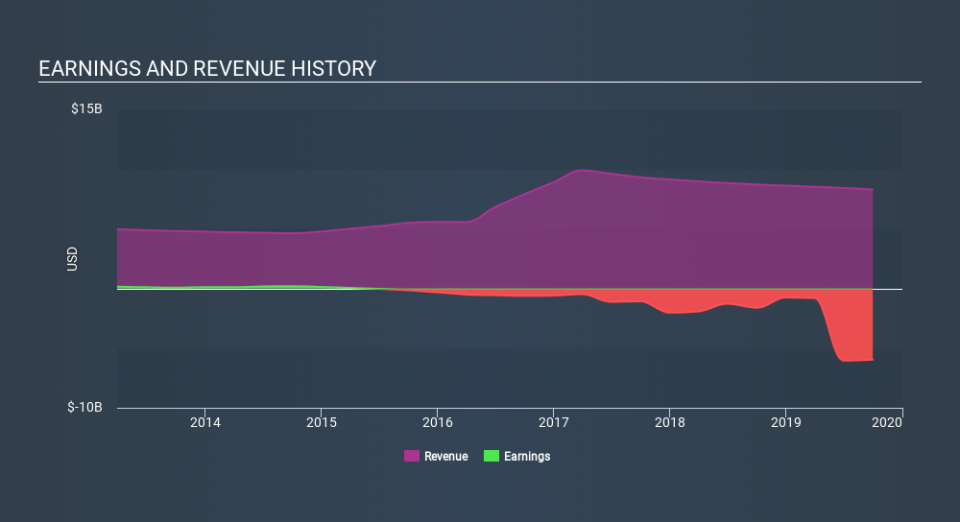Can We See Significant Institutional Ownership On The Frontier Communications Corporation (NASDAQ:FTR) Share Register?

We note that Fronter Communications recently filed for bankruptcy, and as such any ownership structure will likely change radically during the bankruptcy process.
Every investor in Frontier Communications Corporation (NASDAQ:FTR) should be aware of the most powerful shareholder groups. Institutions will often hold stock in bigger companies, and we expect to see insiders owning a noticeable percentage of the smaller ones. Companies that have been privatized tend to have low insider ownership.
Frontier Communications is a smaller company with a market capitalization of US$63m, so it may still be flying under the radar of many institutional investors. In the chart below, we can see that institutional investors have bought into the company. Let's delve deeper into each type of owner, to discover more about Frontier Communications.
View our latest analysis for Frontier Communications
What Does The Institutional Ownership Tell Us About Frontier Communications?
Institutional investors commonly compare their own returns to the returns of a commonly followed index. So they generally do consider buying larger companies that are included in the relevant benchmark index.
As you can see, institutional investors own 55% of Frontier Communications. This implies the analysts working for those institutions have looked at the stock and they like it. But just like anyone else, they could be wrong. When multiple institutions own a stock, there's always a risk that they are in a 'crowded trade'. When such a trade goes wrong, multiple parties may compete to sell stock fast. This risk is higher in a company without a history of growth. You can see Frontier Communications's historic earnings and revenue, below, but keep in mind there's always more to the story.
Institutional investors own over 50% of the company, so together than can probably strongly influence board decisions. It would appear that 5.2% of Frontier Communications shares are controlled by hedge funds. That catches my attention because hedge funds sometimes try to influence management, or bring about changes that will create near term value for shareholders. Our data shows that BlackRock, Inc. is the largest shareholder with 9.3% of shares outstanding. The second and third largest shareholders are The Vanguard Group, Inc. and Charles Schwab Investment Management, Inc., holding 5.8% and 5.7%, respectively.
A closer look at our ownership figures suggests that the top 18 shareholders have a combined ownership of 50% implying that no one share holder has a majority.
Researching institutional ownership is a good way to gauge and filter a stock's expected performance. The same can be achieved by studying analyst sentiments. Quite a few analysts cover the stock, so you could look into forecast growth quite easily.
Insider Ownership Of Frontier Communications
While the precise definition of an insider can be subjective, almost everyone considers board members to be insiders. Company management run the business, but the CEO will answer to the board, even if he or she is a member of it.
Most consider insider ownership a positive because it can indicate the board is well aligned with other shareholders. However, on some occasions too much power is concentrated within this group.
Our most recent data indicates that insiders own some shares in Frontier Communications Corporation. It has a market capitalization of just US$63m, and insiders have US$723k worth of shares, in their own names. Some would say this shows alignment of interests between shareholders and the board, though I generally prefer to see bigger insider holdings. But it might be worth checking if those insiders have been selling.
General Public Ownership
With a 39% ownership, the general public have some degree of sway over FTR. This size of ownership, while considerable, may not be enough to change company policy if the decision is not in sync with other large shareholders.
Next Steps:
It's always worth thinking about the different groups who own shares in a company. Following its recent bankruptcy filing, the ownership structure of the company is likely to change drastically, which may render our data here irrelevant.
NB: Figures in this article are calculated using data from the last twelve months, which refer to the 12-month period ending on the last date of the month the financial statement is dated. This may not be consistent with full year annual report figures.
The original version of this article discussed Frontier Communications' beta, which is irrelevant following its recent bankruptcy filing, and was published in error. We apologise for our mistake. If you spot an error that warrants correction, please contact the editor at editorial-team@simplywallst.com. This article by Simply Wall St is general in nature. It does not constitute a recommendation to buy or sell any stock, and does not take account of your objectives, or your financial situation. Simply Wall St has no position in the stocks mentioned.
We aim to bring you long-term focused research analysis driven by fundamental data. Note that our analysis may not factor in the latest price-sensitive company announcements or qualitative material. Thank you for reading.


